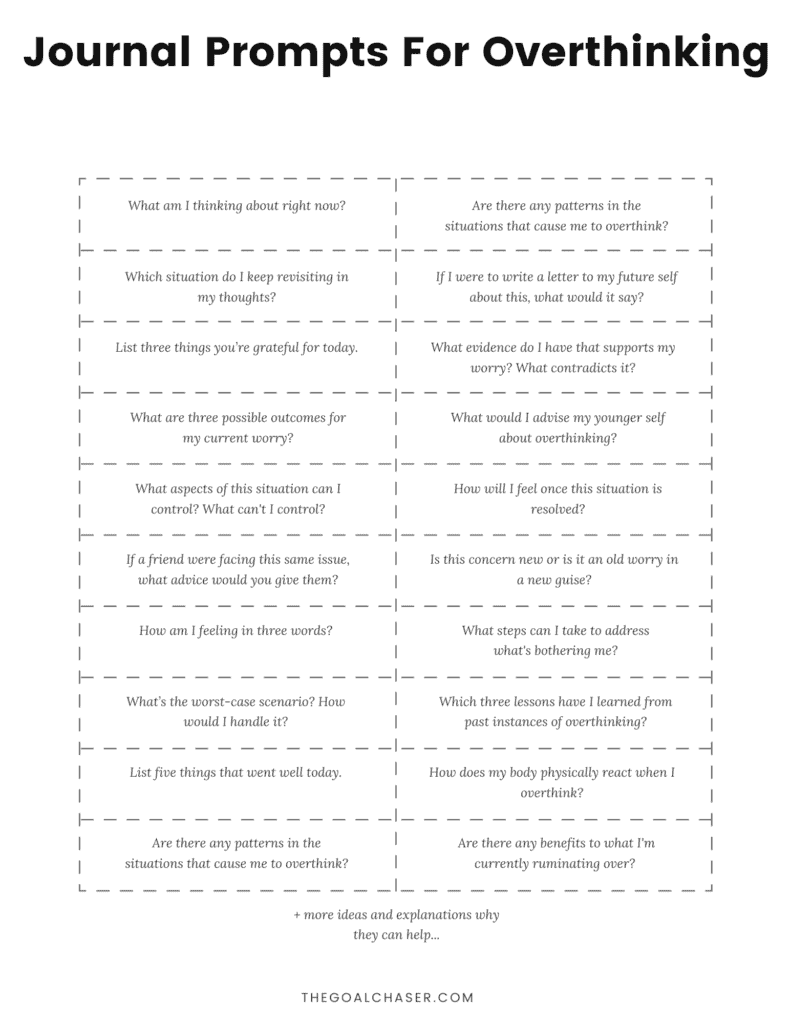25 Journal Prompts For Overthinking (+ Why They Help)
Overthinking can often feel like a flurry of uncontrollable thoughts, clouding our judgment and consuming our mind. It can be utterly exhausting!
I often find that journaling can be a simple, yet powerful means to process, reflect, and gain clarity. You can also make it either a quick exercise, or spend a bit longer if needed.
This post delves into the many benefits of journaling to overcome overthinking, and a long list of prompts you can start using right away.
Dive in and discover the peace that journaling can bring to your busy mind.
Benefits of Journaling for Overthinking:
- Clarity: Writing down your thoughts helps to declutter the mind, making room for solutions and fresh perspectives.
- Reflection: Journaling allows you to revisit and analyze your thoughts, aiding in identifying patterns or triggers of overthinking.
- Emotional Release: Penning down feelings can provide a therapeutic release, easing mental and emotional strain.
- Problem Solving: Breaking down problems on paper can simplify them, making solutions more apparent.
- Mindfulness: The act of journaling keeps you present, reducing anxiety about the past or future.
- Reduced Rumination: By expressing concerns, fears, and doubts on paper, you can decrease the cycles of repetitive thinking.
- Enhanced Self-awareness: It promotes self-discovery and a deeper understanding of personal motives and reactions.
Journal Prompts For Overthinking
What am I thinking about right now?
Helps initiate the journaling process and sets the stage for deeper introspection.
Which situation do I keep revisiting in my thoughts?
Encourages confrontation of recurrent thoughts, paving the way for resolution.
What are three possible outcomes for my current worry?
Broadens perspective and makes us realize that not all outcomes are negative.
What aspects of this situation can I control? What can’t I control?
Helps in discerning between actionable steps and unnecessary worries.
If a friend were facing this same issue, what advice would you give them?
Enables objective reflection by viewing the issue from an outsider’s perspective.
How am I feeling in three words?
Enhances emotional literacy and promotes concise emotional expression.
What’s the worst-case scenario? How would I handle it?
Addresses fears head-on and fosters problem-solving skills.
List five things that went well today.
Shifts focus from overthinking to positive reflection.
Are there any patterns in the situations that cause me to overthink?
Aids in identifying triggers or recurring themes in overthinking episodes.
If I were to write a letter to my future self about this, what would it say?
Offers perspective by examining the situation’s long-term significance.
What evidence do I have that supports my worry? What contradicts it?
Promotes a balanced viewpoint by considering both sides of a worry.
What would I advise my younger self about overthinking?
Encourages self-compassion and wisdom-sharing.
How will I feel once this situation is resolved?
Focuses on desired outcomes, promoting positive visualization.
Is this concern new or is it an old worry in a new guise?
Helps in distinguishing between unique issues and repetitive anxieties.
What steps can I take to address what’s bothering me?
Transforms passive rumination into proactive problem-solving.
Which three lessons have I learned from past instances of overthinking?
Utilizes past experiences for current growth.
How does my body physically react when I overthink?
Connects mental patterns with physical sensations, promoting holistic well-being.
Are there any benefits to what I’m currently ruminating over?
A positive twist on concerns, looking for silver linings.
If this were a story, how would it play out with my concern at the center?
Channels overthinking into creativity, diminishing its intensity.
Can I recall a time when I overthought something and everything turned out okay?
Reminds you of past successes in managing overthinking.
ow would I approach this if I had no fears or doubts?
Addresses underlying emotions and imagines decisive action.
Which affirmations can I remind myself of when I start to overthink?
Develops positive self-talk tools to counteract overthinking.
Who can I turn to when I feel overwhelmed by my thoughts?
Recognizes external support systems available during challenging times.
Do I notice a theme in the topics I tend to overthink about?
Identifies overarching patterns in overthinking, which can be addressed holistically.
Where is my calm and centered place? Can I describe it?
Redirects focus to a peaceful state, reducing the momentum of overthinking.
By integrating these journal prompts into regular practice, we can develop a deeper understanding of our overthinking patterns, and subsequently, tools to manage and reduce them.
If you liked these journaling prompts for overthinking, you may also like:






